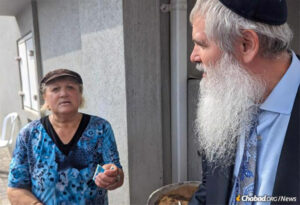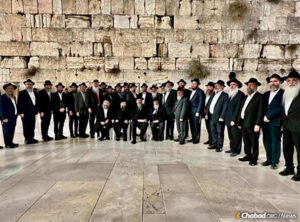|
Getting your Trinity Audio player ready...
|
26 Chabad rabbis from around North America insisted that they ‘had to be here’
By: Bruria Efune
It’s Tuesday at 3:30 p.m. in southern Israel. The air-raid sirens blare as a busload of Chabad rabbis from the United States and Canada rush out onto the sidewalk and lay down flat with their hands on their heads, as instructed.
“Honestly, I don’t know how this is done and how this is possible,” Rabbi Fishel Zaklos told Chabad.org. “It’s my first time experiencing this, and it’s one thing to hear about it, but to experience it … I seriously don’t understand this.”
Rabbi Zaklos, who co-directs Chabad of Naples and Marco Island in Florida with his wife, Ettie, arrived in Israel on Monday morning as part of a delegation of Chabad rabbis, who came to bring solidarity, support and donations from their communities to the people in Israel. They are believed to be the largest rabbinic delegation by far to visit since the Oct. 7 massacre.
Beersheva is home to Soroka Hospital— the largest hospital in the south— which absorbed the majority of the injured victims from the terrorist attack and the continued daily barrages of rocket fire. The rabbis split up in the hospital to visit patients and give out cards and gifts.

In one room, Rabbi Zaklos met Amiram, an Israeli Defense Forces soldier who fought off several terrorists before being shot twice and suffering a serious injury. Zaklos read and delivered a card from a community member, “Hi and Shalom, I’m writing from Naples, Florida, to wish you positive healing. We see what you’ve endured and the evil you faced. I am sorry you’re hurt, and I wish you refuah shlema. May G‑d protect you, and help you heal soon. Love always, Rachel.”
Amiram took the card with a smile. “This means so much to me,” he said. “Thank you for coming here, thank you for what you are doing.”
‘I Have to Be Here’
Asked why he came, Rabbi Yisroel Bernath, co-director of Chabad NDG in Montreal, said that “ever since the war broke out, I’ve been thinking what can I do? What can I do? We collected gear for soldiers. We’ve been working on a big billboard campaign in Montreal. And then it was just, I have to be here. I have to be here to be with the soldiers, to be with the people, to stand shoulder to shoulder, to say that we in the Diaspora really support Israel in their darkest hours.”
The delegation’s first stop was a visit to the small town where the residents of Kfar Aza were relocated to. Outside on the grass, on white plastic chairs, the kibbutz members sit in circles, each circle sitting shiva for another family of the 70 murdered or missing from their small, close-knit community. The shiva circles have carried on in a continuous chain as bodies are still being identified.

Rabbi Dovid Eliezrie, co-director of Chabad of Yorba Linda, reported to his community in a live video: “We heard stories from people who spent 30, even 40 hours in secure rooms hoping the army would come save them. We heard from families who lost loved ones, we felt their pain and expressed that it is shared by all of the Jewish people. Israel is going through a time of crisis, and we Jews around the world need to understand that they’re going through deep pain, and we have to stand together with them. We hope that G‑d sends them consolation and that our visit here gives them a sense that they are not just mourning alone, but all of the Jewish people are mourning with them.”
Bernath says he hasn’t been able to sleep since he arrived, “The stories we’ve been hearing are reminiscent of the Holocaust,” he said. “I don’t use that word lightly. I listened as a mother, Rotem Holin, told me how she sat in her bomb shelter with two small children, not moving for six hours while terrorists walked in and out. I can’t believe this is happening in my lifetime. Soldiers from the search-and-rescue team pulled out their phones and showed me devastating pictures that are forever imprinted in mind. I can’t unsee the sheer brutality the Hamas terrorists committed. I have come to bear witness to these atrocities. I’m still in shock.”
A particularly painful stop for the delegation was a visit to the headquarters for the families of the hostages taken by Hamas. The rabbis spoke with the parents, siblings and children of hostages, who thanked them for coming and appealed to the Jewish communities worldwide for help.

Shelley Shemtov, the mother of Omer Shemtov, recorded a video with Rabbi Zaklos, speaking in a broken voice: “From Saturday morning, we are in a nightmare. Our son was kidnapped by murderers, and I don’t know what they are doing with him. I don’t know if he is eating or if they are beating him. No mother in the world should feel like I feel. They took families, they took babies, they took children from their homes. Please, we want your help to bring them back home safely. Please.”
“My heart is broken, I can’t breathe,” Rabbi Zaklos wrote to his community. “Let’s do everything we can to make a difference.”
In Sderot, a city where dozens were murdered by terrorist fire on Oct. 7 and more than 1,000 rockets have been fired in the two weeks since, the delegation visited the Chabad Center that also serves as a bomb shelter and has been turned into an emergency food warehouse. Most of the local residents evacuated, but for the estimated 6,000 to 8,000 who remain, there is nowhere to shop for food and no deliveries being made. Rabbi Asher and Nechama Pizem, together with a brave team of volunteers, have been working around the clock to ensure that no one in Sderot goes hungry.
Several rabbis from the delegation came with large donations from their communities to help the impromptu warehouse keep running.

“Sderot hit me,” says Bernath. “It was eerie, quiet; there’s almost no one there. We saw the work Chabad is doing there now. A guy walked in to get food; his house was just destroyed by a rocket. Another young man walked in; he had lost his sister. Of course, he was devastated. He started talking to me, and we just both broke down crying together. And I gave him a big hug and said, ‘I’m here with you.’ And that’s what we came for. We came just to be here.”
Prayers at the Kotel
On Monday night, Israel’s Chief Rabbi David Lau and Rabbi of the Western Wall Shmuel Rabinovitch met the delegation at the Kotel in Jerusalem. Together, they recited Tehillim (“Psalms”) for the injured, Yizkor for those who were lost, and a heartfelt Mi Sheberach for the brave soldiers and hostages.
Rabbi Moshe Bryski, executive director of Chabad of the Conejo in Agoura Hills, Calif., spoke, saying “we’re here to visit with the families who have lost loved ones, to comfort them in their time of pain and to let them know that their pain is our pain. We are one family, and we feel their pain and cry along with them.”

Addressing their early meeting, he continued: “We met with the families of those who are being held hostage, and listened to the anguish that they feel. We prayed with them, and we will take their message back to the entire world so that the world will not remain silent until every one of them is returned to their homes.”
In powerful words, Bryski continued, emphasizing that “we’re here to deliver a message to the members of the IDF, to the modern-day Maccabees, to our heroes, that they should be strong—chazak, chazak, venischazek. They should go in knowing that the entire Jewish world is united behind them. And they don’t just represent themselves; they represent all generations from the days of Avraham all throughout Jewish history, and they represent every Jewish family on the face of the earth, and that their mission is a holy mission. G‑d should protect them and watch over them, and every single one should come home safely, without any injuries.”
In the words of Rabbi Bernath, “the gathering crescendoed with the collective singing of ‘Ani Ma’amin,’ a proclamation of unyielding faith, followed by ‘Hoshea Es Amecha,’ a plea for salvation. Each voice was a melody, each melody a prayer, and each prayer a defiant testament to the strength and unity of the Jewish people.”

On Tuesday evening, the rabbis went to bring strength and encouragement to IDF soldiers. They visited an army base, grilled a BBQ for the soldiers, handed them gifts and cards from their communities, and danced.




